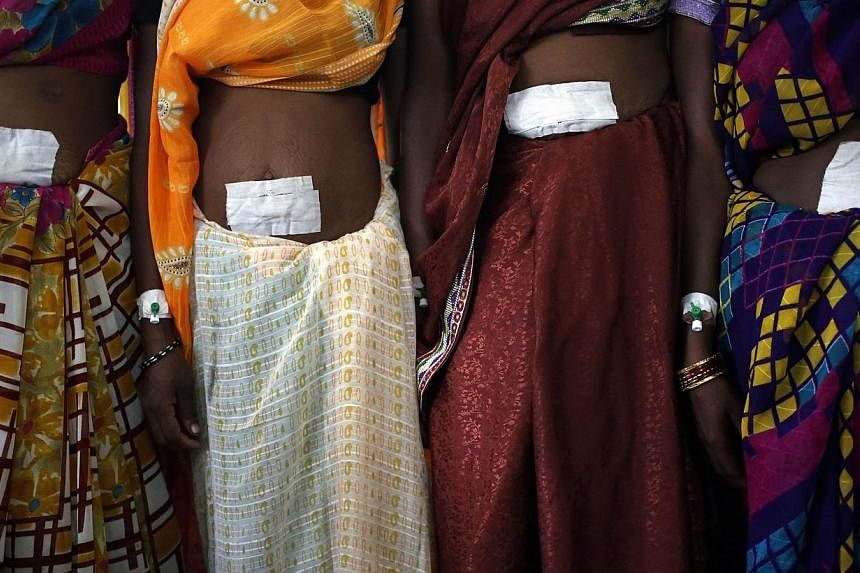NEW DELHI (AFP) - An independent investigation into the death of 13 women in India after mass sterilisation surgeries found the doctor and his staff used the same needles for all the procedures and never changed their gloves.
The women died after being paid to have the surgery at a state-run camp in Chhattisgarh state last month. Dozens of others ended up in hospital in an incident which sparked widespread criticism of India's family planning programme.
Authorities have blamed the deaths on the drugs given to the women after the operations, which they said contained a chemical commonly found in rat poison.
But an investigation by a team from four public health organisations found that the doctor and his staff operated on the 83 women in unhygienic conditions and that some of them probably died of infection.
"None of the staff changed their hand gloves in between the procedures. The same injection needle and syringe, and the suture needle were used for all the cases," the team's report revealed.
"Neither were those sterilised nor new needles taken for each case," said the report seen by AFP.
The women suffered vomiting and a dramatic fall in blood pressure after undergoing laparoscopic sterilisation, a process in which the fallopian tubes are tied.
Sterilisation is one of the most popular methods of family planning in India, and many state governments organise mass camps where mainly poor and rural women are paid 1,400 rupees (S$30) to undergo the procedure.
Although the surgery is voluntary, rights groups say the target-driven nature of the programme has led to women being coerced into being sterilised - often in horrific conditions.
The women were forced to lie on mattresses on the floor after the operations, which were conducted in just a total of 90 minutes.
"A total of 83 women were... operated in about one and a half hours, approximately one to one and a half minutes per surgery," the report said.
They were swiftly sent home and never received any post-operative care, it added.
The doctor who performed the operations has denied any wrongdoing and claimed he was being made a scapegoat following his arrest over the deaths.
The government has said initial tests on antibiotics given to the women showed they were toxic, and police have arrested the local drug factory owner and his son.
Although tainted drugs could have caused the deaths, interviews with the doctor who conducted post-mortem examinations on the first seven women "suggested sepsis leading to septicaemia" was to blame, the report said.
A public health expert said authorities should take note of the terrible conditions at the camp, rather than focusing only on the drugs. Poonam Muttreja, director of Population Foundation of India, said authorities had also completely overlooked the way the women were treated.
"At the camp, there was complete disregard for the dignity of women," said Muttreja, whose organisation took part in the investigation. "None of the women were told about the procedure, what was to be done, what the side-effects could be," she told AFP.
The team inspected the decommissioned hospital on the outskirts of Bilaspur where the surgeries were performed and two other camps. It interviewed women who fell sick but survived, families of the victims and doctors and support staff.
The investigation is separate from an ongoing judicial inquiry ordered by the state government. Autopsy reports and final toxicology results on the suspect drugs have not been made public.

